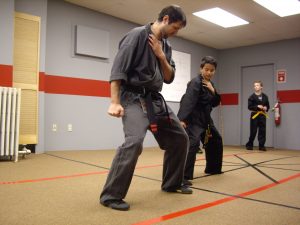 American Kenpo Karate
American Kenpo Karate
American Kenpo Karate is well round self-defense system, that incorporates theories, principles and concepts to motion and movement based on what is useful, less useful, and useless. It incorporates the whole body as a weapon, and out of the box thinking, blurring the lines between what is a block and what is a strike. This system is designed to protect one’s self against the modern day street fighters and criminals that pose a threat to one’s security, safety, and life.
Novice Level – Learning the Basic (1-2 years)
The Basics is the utmost important part of your training, it is your foundation. First learning your basics, I advise you to train in a step by step process. Also known as, by the numbers, or the ABC approach. Train and move at a slower pace for training purposes, this is to perfect your motion.
Some Basics Include:
- Stances
- Foot Maneuvers (footwork)
- Blocks
- Strikes
Intermediate Level – Learning Theories, Principles, and Concepts (4-6 years)
At this level you are beginning to incorporate your basics into self-defense techniques. At this Level you learn to apply principles such as whipping, thrusting and slicing, incorporate concepts to economize your motion and adapt to your opponent, and apply theories of practical application. At this level you are analyzing and studying the motion of Kenpo. This is the experimental stage of learning to apply and improve your skill and ability. You are becoming a practitioner of the art of Kenpo. The Art will become a science of motion.
Some Theories of Kenpo:
- Centerline Theory
- Zone Theory
Some Principles of Motion of Kenpo:
- Slicing
- Whipping
- Thrusting
- Hooking
Some Concepts of Kenpo:
- Orbiting
- Point of Origin
- Marriage of Gravity
Advance Stages – Movement without thought (2-4 years +)
The advance stages of Kenpo require you to begin to adapt all of your skills and ability to your particular situation. Move with a free mind and apply your technique with control and without constraint. You should be able to adapt to any situation. This level is a refinement of one’s self. And is a Path to Mastery. Very few make it to this level; it requires dedication and perfection through disciplining one’s self.
“Mastery is a process. It is the process of renewal.”, by Skip Hancock – The path of Excellence.
My fascination that I have with this system is the ability to study and adapt the system to fit the situation and the practitioner. Using a weapon such as a basic punch and being able to apply it in multiple different ways to create multiple outcomes that I as a practitioner choose to apply. It is an endless journey. Very few choose to take this journey.